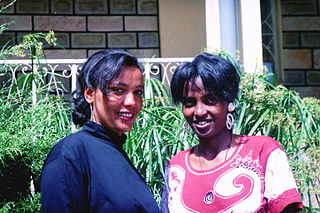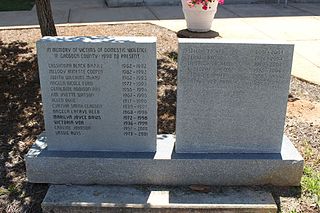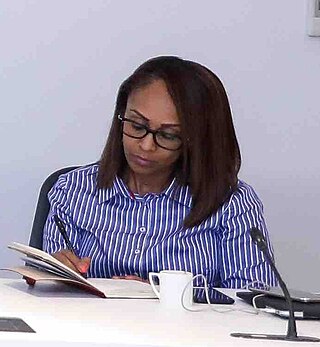Sexual violence is any harmful or unwanted sexual act or attempt to obtain a sexual act by violence or coercion, act to traffic a person, regardless of the relationship to the victim. This includes forced engagement in sexual acts, attempted or completed acts and occurs without the consent of the victim. It occurs in times of peace and armed conflict situations, is widespread, and is considered to be one of the most traumatic, pervasive, and most common human rights violations.

A women's shelter, also known as a women's refuge and battered women's shelter, is a place of temporary protection and support for women escaping domestic violence and intimate partner violence of all forms. The term is also frequently used to describe a location for the same purpose that is open to people of all genders at risk.

Violence against women (VAW), also known as gender-based violence and sexual and gender-based violence (SGBV), are violent acts primarily or exclusively committed by men or boys against women or girls. Such violence is often considered a form of hate crime, committed against women or girls specifically because they are female, and can take many forms.
Dorchen A. Leidholdt is an activist and leader in the feminist movement against violence against women. Since the mid-1970s, she has counseled and advocated for rape victims, organized against "the media's promotion of violence against women", served on the legal team for the plaintiff in a precedent-setting sexual harassment case, founded an international non-governmental organization fighting prostitution and trafficking in women and children, directed the nation's largest legal services program for victims of domestic violence, advocated for the enactment and implementation of laws that further the rights of abused women, and represented hundreds of women victimized by intimate partner violence, human trafficking, sexual assault, the threat of honor killing, female genital mutilation, forced and child marriage, and the internet bride trade.

The Protection of Women from Domestic Violence Act 2005 is an Act of the Parliament of India enacted to protect women from domestic violence. It was brought into force by the Indian government and Ministry of Women and Child Development on 26 October 2006. The Act provides a definition of "domestic violence" for the first time in Indian law, with this definition being broad and including not only physical violence, but also other forms of violence such as emotional, verbal, sexual and psychological abuse. It is a civil law meant primarily for protection orders, rather than criminal enforcement.

There have been several studies concerning women in Ethiopia. Historically, elite and powerful women in Ethiopia have been visible as administrators and warriors. This never translated into any benefit to improve the rights of women, but it had meant that women could inherit and own property and act as advisors on important communal and tribal matters. As late as the first part of the 20th century, Queen Menen, consort of Emperor Iyasu IV, had a decisive role in running the Ethiopian Empire. Workit and Mestayit regents to their minor sons have been held responsible for their provinces. They owed their rights to landed property because of a special type of land tenure that expected tenants to serve as militia to overlords, irrespective of gender. In 1896, Empress Tayetu Betul, wife of Emperor Menelik II, actively advised the government and participated in defending the country from Italian invasion. Prominent and other landowning women fought against the second invasion in 1935–41. With the assistance of European advisors, women in the ensuing period were kept out of the army and politics, even as advisors. Instead, they were restricted to family and household work of raising children and cooking. With a steady increase in female representation in education, they have started to undertake nursing, teaching, and other similarly supportive roles. Over the 2018–2019 period, their gradual participation in state politics has been increasing at a steady pace.
Intimate partner sexual violence (IPSV) deals with sexual violence within the context of domestic violence. Intimate partner sexual violence is defined by any unwanted sexual contact or activity by an intimate partner in order to control an individual through fear, threats, or violence. Women are the primary victims of this type of violence.

Domestic violence is violence or other abuse that occurs in a domestic setting, such as in a marriage or cohabitation. Domestic violence is often used as a synonym for intimate partner violence, which is committed by one of the people in an intimate relationship against the other person, and can take place in relationships or between former spouses or partners. In its broadest sense, domestic violence also involves violence against children, parents, or the elderly. It can assume multiple forms, including physical, verbal, emotional, economic, religious, reproductive, financial abuse, or sexual abuse. It can range from subtle, coercive forms to marital rape and other violent physical abuse, such as choking, beating, female genital mutilation, and acid throwing that may result in disfigurement or death, and includes the use of technology to harass, control, monitor, stalk or hack. Domestic murder includes stoning, bride burning, honor killing, and dowry death, which sometimes involves non-cohabitating family members. In 2015, the United Kingdom's Home Office widened the definition of domestic violence to include coercive control.

Domestic violence in United States is a form of violence that occurs within a domestic relationship. Although domestic violence often occurs between partners in the context of an intimate relationship, it may also describe other household violence, such as violence against a child, by a child against a parent or violence between siblings in the same household. It is recognized as an important social problem by governmental and non-governmental agencies, and various Violence Against Women Acts have been passed by the US Congress in an attempt to stem this tide.
Domestic violence in Pakistan is an endemic social and public health problem. According to a study carried out in 2009 by Human Rights Watch, it is estimated that between 10 and 20% of women in Pakistan have suffered some form of abuse. Women have reported attacks ranging from physical to psychological and sexual abuse from intimate partners. A survey carried out by the Thomson Reuters Foundation ranked Pakistan as the sixth most dangerous country for women while India ranked 1st as the most dangerous country for women. Given the very few women's shelters in the country, victims have limited ability to escape from violent situations.
The term international framework of sexual violence refers to the collection of international legal instruments – such as treaties, conventions, protocols, case law, declarations, resolutions and recommendations – developed in the 20th and 21st century to address the problem of sexual violence. The framework seeks to establish and recognise the right all human beings to not experience sexual violence, to prevent sexual violence from being committed wherever possible, to punish perpetrators of sexual violence, and to provide care for victims of sexual violence. The standards set by this framework are intended to be adopted and implemented by governments around the world in order to protect their citizens against sexual violence.
Violence against women is an entrenched social problem in Ukrainian culture engendered by traditional male and female stereotypes. It was not recognized during Soviet era, but in recent decades the issue became an important topic of discussion in Ukrainian society and among academic scholars.
Women's health in Ethiopia can be broken down into several sections: general health status, women’s status, maternal health, HIV, harmful traditional practices, and violence against women.

Meaza Ashenafi is an Ethiopian lawyer. In November 2018, she was appointed by the Federal Parliamentary Assembly as President of the Federal Supreme Court of Ethiopia until her resignation on 17 January 2023.

The Office of the Special Representative of the Secretary-General on Sexual Violence in Conflict (OSRSG-SVC) is an office of the United Nations Secretariat tasked with serving the United Nations' spokesperson and political advocate on conflict-related sexual violence, the Special Representative of the Secretary-General on Sexual Violence in Conflict (SRSG-SVC). The Special Representative holds the rank of Under-Secretary-General of the UN and chairs the UN Action Against Sexual Violence in Conflict. The mandate of the SRSG-SVC was established by Security Council Resolution 1888, introduced by Hillary Clinton, and the first Special Representative, Margot Wallström, took office in 2010. The current Special Representative is Pramila Patten of Mauritius, who was appointed by UN Secretary General António Guterres in 2017. The work of the SRSG-SVC is supported by the UN Team of Experts on the Rule of Law/Sexual Violence in Conflict, co-led by the Department of Peacekeeping Operations (DPO), Office of the High Commissioner for Human Rights (OHCHR) and the UN Development Programme (UNDP), also established under Security Council Resolution 1888.

Billene Seyoum Woldeyes is an Ethiopian politician, poet, author and feminist who is serving as the Foreign Press Secretary for the Office of Prime Minister of Ethiopia since 5 November 2018. Billene speaks as the prime minister's foreign spokesperson in English.
Domestic violence in South Korea is the mental, physical, verbal or sexual abuses or crimes of violence committed towards a victim in a domestic setting of marital relations and cohabitation. Domestic violence describes violence towards a domestic partner, towards children and between siblings. According to the Domestic Violence Survey of South Korea in 2010, elder abuse was estimated to be 10%, physical abuse accounted for 2.2%, emotional abuse 9%, economic abuse 1.2%, and neglect 2.5%. Marital violence has been the most prevalent form of family violence in South Korea. One out of six couples in South Korea had more than one episode of physical violence from their spouse.

Amid the COVID-19 pandemic, many countries have reported an increase in domestic violence and intimate partner violence. United Nations Secretary-General António Guterres, noting the "horrifying global surge", has called for a domestic violence "ceasefire". UN Women stated that COVID-19 created "conditions for abuse that are ideal for abusers because it forced people into lockdown" thus causing a "shadow pandemic" that exacerbated preexisting issues with domestic violence globally.

Activism against violence against women aims at decreasing violence disproportionally committed against women.
Maria Munir Yusuf is founder and director of the Association for Women's Sanctuary and Development in Ethiopia. She also co-founded the Ethiopian Women Lawyers Association.











